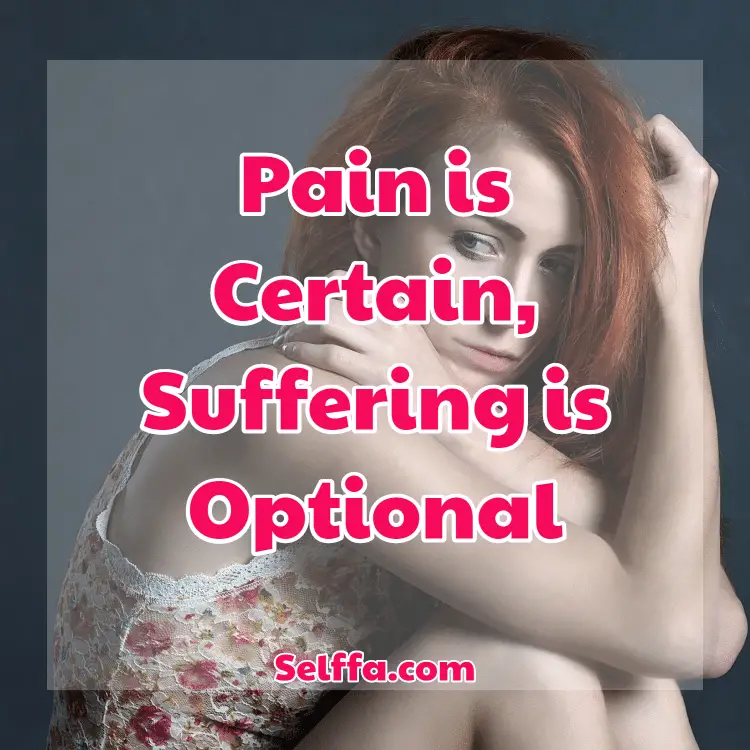“Am I good enough?” “What did I do to deserve this?” “People just don’t understand me.”
How often do we hear this sabotaging narrative playing in our own head like a record?
by Rushi Vyas
While feeling sad, frustrated, or lonely are perfectly human emotions, does creating a narrative to go alongside them actually help us move forward? It’s as if we think life circumstances will magically change if we just complain loud enough. We get it: shit happens.
The first Buddhist Noble Truth says right up front, “Life is suffering.” The first step of practicing Buddhists is to accept this as a truth.
I am not Buddhist. But I strive to understand teachings of many kinds from science to spiritual. I used to fight against this Truth. Life is suffering?
That didn’t jive well with my positive outlook on life. What about happiness, joy, bliss, you know, the good stuff?
It wasn’t until recently that I’ve begun to understand the meaning of the truth and that it does not contradict a positive outlook on existence.
The essence of existence may not be suffering, but the circumstances of life inherently do bring challenges. How deep our attachment is to those circumstances directly impacts the amount of suffering we feel.
The more “in the box” we are and unable to take different perspectives, the more likely we are to experience life “as a mess,” feel “misunderstood,” and say “this sucks!”
Suffering is not actually the best word in translation. The original word in Sanskrit is Dukkha, which does not have an accurate translation in English, hence the typical incomplete translation to “suffering.” Buddhist teachings break dukkha down into three forms:
- Dukkha dukkha, is the unpleasant feeling and sensation we experience from negative physical or mental experiences such as physical pain or loss of a loved one. Unpleasant events inevitably happen in life. This teaching reminds us that we do have the option to accept negative events in life and feel them fully, rather than resist and suppress them.
- Sankhara dukkha, refers to the formation of thoughts and dialogue that we create to accompany experiences. Following, usually unpleasant, events we may take on the role of the victim, or a monologue of self-righteousness thereby further boxing us into our own perspective and indirectly increasing our suffering in the long run.
- Viparinama dukkha, is the suffering that comes from experiences that are actually pleasant. Examples include addiction to substances, or claims “in love” that we could not live without a person or a thing. Again, the thoughts and stories we create and continue to feed usually lead to this suffering. Essentially, this suffering comes from fighting against the law of impermanence: nothing lasts forever. [8]
Well, if pleasant experiences are suffering too then we’re screwed? Not exactly.
Positive psychology, mindfulness, and even breakthroughs in quantum physics and an electromagnetic understanding of our brain, remind us that we do have a choice.
We do have an alternative.
We could choose to accept any circumstance in life for what it is. Then, instead of feeding our internal storylines or dialogues, we can feel the emotions we have. Once we process the emotions, we can start to embody the change we would like to create. From the present moment, we can start to embody the qualities we would like to have whether it be strength, love, courage, or openness to others.
Let’s start with positive psychology.
As a field, positive psychology has gotten much backing in recent years. Still, I know many friends who are self-proclaimed “realists” and think positive-thinkers are just deluding themselves. In response to that thinking, positive psychologist Dr. Martin E. Seligman has some words from his book Learned Optimism: How to Change Your Mind and Your Life:
“Life inflicts the same setbacks and tragedies on the optimist as on the pessimist, but the optimist weathers them better. Because of (her) resilience, the optimist achieves more at work, at school, and on the playing field. The optimist has better physical health and may even live longer.
…Giving up pessimism and becoming more optimistic may seem undesirable to some of you. Your image of an optimist may be the crashing bore, the self-aggrandizing braggart, the chronic blamer of others, never taking responsibility for his own mistakes. But neither optimism nor pessimism has a corner on bad manners…becoming an optimist consists not of learning to be more selfish, self-assertive and to present yourself to others in overbearing ways, but simply of learning a set of skills about how to talk to yourself when you suffer a personal defeat.” [1]
On a practical level, studies on positive psychology in the workplace show that employees with positive psychological outlooks on life, including optimism and resilience, showed higher scores of well-being over a long period of time compared to employees who did not hold a similar outlook on life [2]. Similarly, results show that positive psychology is trainable and on-the-job performance can be increased with a positive psychological outlook [3]. Employers may start paying optimistic people more, if that hasn’t happened already.
What helps us develop a positive psychological outlook? Look no further than mindfulness. A literature review of a few hundred empirical studies on psychology and mindfulness, written by researchers at Duke University, concluded that mindfulness practice leads to “various positive psychological effects, including increased subjective well-being, reduced psychological symptoms and emotional reactivity, and improved behavioral regulation,” [4]. Mindfulness teaches us to embrace the present moment. This acceptance allows us to view the moment with clarity. Thus we are better able to lucidly decide what qualities and thoughts to nourish that will allow us to embody the positive change we would like to bring to any situation.
Much of this is intuitive.
We do have a choice when we meet suffering in life. If we choose to be mindful of the situation from different perspectives, allow the space to feel emotion, and choose to think and act in positive ways, we will better be able to maintain happiness even through difficulties.

Ask yourself, ask the Universe, with an open mind and heart… what else could this mean?
What isn’t as straight forward is what physicists and neurological research are beginning to suggest. What if positive thoughts don’t just manifest in our heads but actually in our being and the electromagnetic frequencies we carry around with us everywhere we go? What if people can experience us as being positive or negative before we even open our mouth?
You’ve probably experienced this. You know, that person who enters the room and brightens it up simply by sitting quietly. Or, that person who enters the room and seems to bring the mood down, simply by being there. What is that?
The answer may rest in physics at the quantum level.
Quantum physicists such as Dr. Henry P. Stapp advocate that there are likely processes going on at a quantum particle level rather than just the material level between electrical impulses and synapses [5]. Many of the implications are that the mind may extend beyond our brain. Our thoughts can manifest as emitted energy affecting the electromagnetic field around our bodies. This may relate to how many report experiencing auras, and also that unspoken energy we experience when positive or negative people interact with us.
Much of this research is still theoretical. While there are pioneering scientists such as Gary Schwartz, Dean Radin, and Rupert Sheldrake trying to explore more into these concepts in a concrete way, there remains a heavy resistance within the scientific community still clinging to a solely materialistic view of science [6]. This resistance was also noted in Orthopedic Surgeon, Robert Becker’s book The Body Electric, which began to explore the effects of electromagnetism in how our bodies interact with the environment around us [7]. So while there is preliminary evidence supporting the idea that our thinking can electromagnetically affect the world around us, we still wait for more backing to explore the concepts.
The next time you catch yourself running these narratives in your head, “Am I good enough?” “What did I do to deserve this?” “People just don’t understand me.” …
…stop kicking your own ass.
Don’t judge yourself for having these thoughts or for ever feeling bad.
Yes, when it rains, it pours… but you ultimately have the choice to create how you perceive things and how the story ends.
You can choose to embody the intrinsic positive qualities that your authentic self posses.
For me personally, having recently lost my father, I have noticed how impactful mindfulness can be. Through mindfulness and watching my thoughts, I have been able to slowly but surely embody the strength and love I want to bring to those around me.
What about you?
What are the qualities you are looking to embody?
Why not start right now despite the shit that may be going on in your life?

